Are Humans Omnivores?
A natural diet for any given species should be the one that gives the species optimum health. Given the health ailments that are significantly reduced by eliminating animal products (cancer, heart disease, diabetes), it suggests that we were never meant to eat animal products. People who are vegan tend not to have such issues. People who are raw vegan notice even more health benefits.
Secondly, I hear all the time that we have canines and therefore, are meant to eat meat. Calling our eye teeth “canines” seems like a big joke to me when you compare them to the teeth of real omnivores. I looked up some of our closest relatives, other primates, and compared omnivores to herbivores and then to humans and guess what:
human skull:
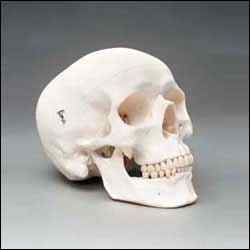
HERBIVORES:
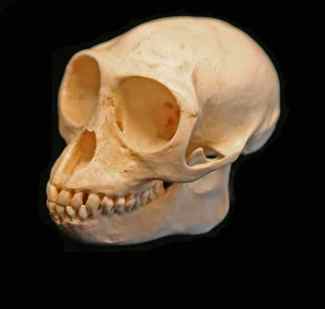
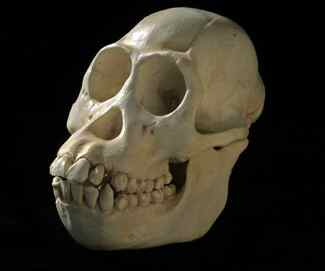
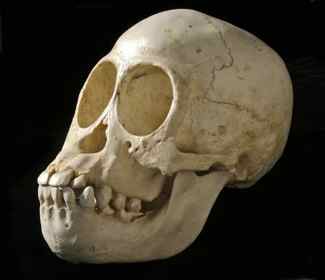
OMNIVORES:
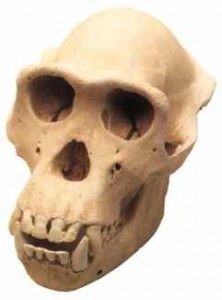
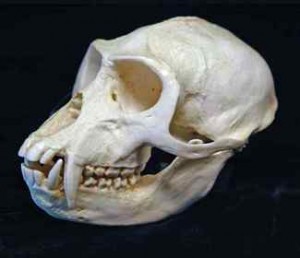
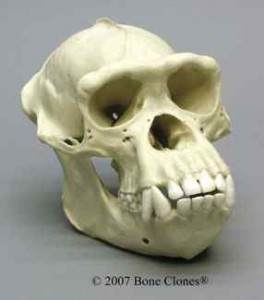
Then of course there’s all this:
Facial Muscles
CARNIVORE: Reduced to allow wide mouth gape
HERBIVORE: Well-developed
OMNIVORE: Reduced
HUMAN: Well-developedÂ
Jaw Type
CARNIVORE: Angle not expanded
HERBIVORE: Expanded angle
OMNIVORE: Angle not expanded
HUMAN: Expanded angle
Jaw Joint Location
CARNIVORE: On same plane as molar teeth
HERBIVORE: Above the plane of the molars
OMNIVORE: On same plane as molar teeth
HUMAN: Above the plane of the molars
Jaw Motion
CARNIVORE: Shearing; minimal side-to-side motion
HERBIVORE: No shear; good side-to-side, front-to-back
OMNIVORE: Shearing; minimal side-to-side
HUMAN: No shear; good side-to-side, front-to-back
Major Jaw Muscles
CARNIVORE: Temporalis
HERBIVORE: Masseter and pterygoids
OMNIVORE: Temporalis
HUMAN: Masseter and pterygoids
Mouth Opening vs. Head Size
CARNIVORE: Large
HERBIVORE: Small
OMNIVORE: Large
HUMAN: Small
Teeth: Incisors
CARNIVORE: Short and pointed
HERBIVORE: Broad, flattened and spade shaped
OMNIVORE: Short and pointed
HUMAN: Broad, flattened and spade shaped
Teeth: CaninesÂ
CARNIVORE: Long, sharp and curved
HERBIVORE: Dull and short or long (for defense), or none
OMNIVORE: Long, sharp and curved
HUMAN: Short and blunted
Teeth: Molars
CARNIVORE: Sharp, jagged and blade shaped
HERBIVORE: Flattened with cusps vs complex surface
OMNIVORE: Sharp blades and/or flattened
HUMAN: Flattened with nodular cusps
Chewing
CARNIVORE: None; swallows food whole
HERBIVORE: Extensive chewing necessary
OMNIVORE: Swallows food whole and/or simple crushing
HUMAN: Extensive chewing necessary
Saliva
CARNIVORE: No digestive enzymes
HERBIVORE: Carbohydrate digesting enzymes
OMNIVORE: No digestive enzymes
HUMAN: Carbohydrate digesting enzymes
Stomach TypeÂ
CARNIVORE: Simple
HERBIVORE: Simple or multiple chambers
OMNIVORE: Simple
HUMAN: Simple
Stomach Acidity
CARNIVORE: Less than or equal to pH 1 with food in stomach
HERBIVORE: pH 4 to 5 with food in stomach
OMNIVORE: Less than or equal to pH 1 with food in stomach
HUMAN: pH 4 to 5 with food in stomach
Stomach Capacity
CARNIVORE: 60% to 70% of total volume of digestive tract
HERBIVORE: Less than 30% of total volume of digestive tract
OMNIVORE: 60% to 70% of total volume of digestive tract
HUMAN: 21% to 27% of total volume of digestive tract
Length of Small Intestine
CARNIVORE: 3 to 6 times body length
HERBIVORE: 10 to more than 12 times body length
OMNIVORE: 4 to 6 times body length
HUMAN: 10 to 11 times body length
Colon
CARNIVORE: Simple, short and smooth
HERBIVORE: Long, complex; may be sacculated
OMNIVORE: Simple, short and smooth
HUMAN: Long, sacculated
Liver
CARNIVORE: Can detoxify vitamin A
HERBIVORE: Cannot detoxify vitamin A
OMNIVORE: Can detoxify vitamin A
HUMAN: Cannot detoxify vitamin A
Kidney
CARNIVORE: Extremely concentrated urine
HERBIVORE: Moderately concentrated urine
OMNIVORE: Extremely concentrated urine
HUMAN: Moderately concentrated urine
Nails
CARNIVORE: Sharp claws
HERBIVORE: Flattened nails or blunt hooves
OMNIVORE: Sharp claws
HUMAN: Flattened nails
Hands
Look at the shape of your hands – they are clearly ‘designed’ to eat fruit, etc. and not kill or skin an
animal to eat its flesh. Our nails are not shaped like claws, and are not strong, but they are designed to
skin an orange. It is obvious that flesh usually needs cooking before humans ingest it, and cooking is not
a ‘natural’ thing to do. Flesh is NOT easily assimilated into our bodies.
Olfactory
Once we start eating our ‘natural’ food source, rather than unnaturally eating flesh, we start to turn up our
noses at the smell. An orange is a pleasing emotional smell. Rotting carcasses are NOT nice to our emotions.
Another clue to the ‘ natural design’ of our bodies.
Visual
Fruit and vegetables are emotionally more pleasing to our eyes.
Audio
We do not like to hear an animal scream – it affects us
emotionally again. We may even prefer the sound of an apple being crunched.
A natural diet for any given species should be the one that gives the species optimum health. Given the health ailments that are significantly reduced by eliminating animal products (cancer, heart disease, diabetes), it suggests that we were never meant to eat animal products. People who are vegan tend not to have such issues. People who are raw vegan notice even more health benefits.
Secondly, I hear all the time that we have canines and therefore, are meant to eat meat. Calling our eye teeth “canines” seems like a big joke to me when you compare them to the teeth of real omnivores. I looked up some of our closest relatives, other primates, and compared omnivores to herbivores and then to humans and guess what:
human skull:

HERBIVORES:



OMNIVORES:



Then of course there’s all this:
Facial Muscles
CARNIVORE: Reduced to allow wide mouth gape
HERBIVORE: Well-developed
OMNIVORE: Reduced
HUMAN: Well-developedÂ
Jaw Type
CARNIVORE: Angle not expanded
HERBIVORE: Expanded angle
OMNIVORE: Angle not expanded
HUMAN: Expanded angle
Jaw Joint Location
CARNIVORE: On same plane as molar teeth
HERBIVORE: Above the plane of the molars
OMNIVORE: On same plane as molar teeth
HUMAN: Above the plane of the molars
Jaw Motion
CARNIVORE: Shearing; minimal side-to-side motion
HERBIVORE: No shear; good side-to-side, front-to-back
OMNIVORE: Shearing; minimal side-to-side
HUMAN: No shear; good side-to-side, front-to-back
Major Jaw Muscles
CARNIVORE: Temporalis
HERBIVORE: Masseter and pterygoids
OMNIVORE: Temporalis
HUMAN: Masseter and pterygoids
Mouth Opening vs. Head Size
CARNIVORE: Large
HERBIVORE: Small
OMNIVORE: Large
HUMAN: Small
Teeth: Incisors
CARNIVORE: Short and pointed
HERBIVORE: Broad, flattened and spade shaped
OMNIVORE: Short and pointed
HUMAN: Broad, flattened and spade shaped
Teeth: CaninesÂ
CARNIVORE: Long, sharp and curved
HERBIVORE: Dull and short or long (for defense), or none
OMNIVORE: Long, sharp and curved
HUMAN: Short and blunted
Teeth: Molars
CARNIVORE: Sharp, jagged and blade shaped
HERBIVORE: Flattened with cusps vs complex surface
OMNIVORE: Sharp blades and/or flattened
HUMAN: Flattened with nodular cusps
Chewing
CARNIVORE: None; swallows food whole
HERBIVORE: Extensive chewing necessary
OMNIVORE: Swallows food whole and/or simple crushing
HUMAN: Extensive chewing necessary
Saliva
CARNIVORE: No digestive enzymes
HERBIVORE: Carbohydrate digesting enzymes
OMNIVORE: No digestive enzymes
HUMAN: Carbohydrate digesting enzymes
Stomach TypeÂ
CARNIVORE: Simple
HERBIVORE: Simple or multiple chambers
OMNIVORE: Simple
HUMAN: Simple
Stomach Acidity
CARNIVORE: Less than or equal to pH 1 with food in stomach
HERBIVORE: pH 4 to 5 with food in stomach
OMNIVORE: Less than or equal to pH 1 with food in stomach
HUMAN: pH 4 to 5 with food in stomach
Stomach Capacity
CARNIVORE: 60% to 70% of total volume of digestive tract
HERBIVORE: Less than 30% of total volume of digestive tract
OMNIVORE: 60% to 70% of total volume of digestive tract
HUMAN: 21% to 27% of total volume of digestive tract
Length of Small Intestine
CARNIVORE: 3 to 6 times body length
HERBIVORE: 10 to more than 12 times body length
OMNIVORE: 4 to 6 times body length
HUMAN: 10 to 11 times body length
Colon
CARNIVORE: Simple, short and smooth
HERBIVORE: Long, complex; may be sacculated
OMNIVORE: Simple, short and smooth
HUMAN: Long, sacculated
Liver
CARNIVORE: Can detoxify vitamin A
HERBIVORE: Cannot detoxify vitamin A
OMNIVORE: Can detoxify vitamin A
HUMAN: Cannot detoxify vitamin A
Kidney
CARNIVORE: Extremely concentrated urine
HERBIVORE: Moderately concentrated urine
OMNIVORE: Extremely concentrated urine
HUMAN: Moderately concentrated urine
Nails
CARNIVORE: Sharp claws
HERBIVORE: Flattened nails or blunt hooves
OMNIVORE: Sharp claws
HUMAN: Flattened nails
Hands
Look at the shape of your hands – they are clearly ‘designed’ to eat fruit, etc. and not kill or skin an
animal to eat its flesh. Our nails are not shaped like claws, and are not strong, but they are designed to
skin an orange. It is obvious that flesh usually needs cooking before humans ingest it, and cooking is not
a ‘natural’ thing to do. Flesh is NOT easily assimilated into our bodies.
Olfactory
Once we start eating our ‘natural’ food source, rather than unnaturally eating flesh, we start to turn up our
noses at the smell. An orange is a pleasing emotional smell. Rotting carcasses are NOT nice to our emotions.
Another clue to the ‘ natural design’ of our bodies.
Visual
Fruit and vegetables are emotionally more pleasing to our eyes.
Audio
We do not like to hear an animal scream – it affects us
emotionally again. We may even prefer the sound of an apple being crunched.